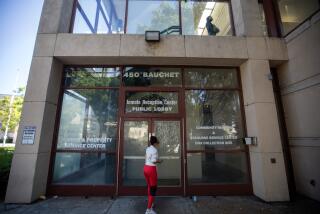Surveillance System Planned for L.A. Jail
As they await autopsy results on a handcuffed prisoner who died in an altercation with deputies, Los Angeles County Sheriff’s Department officials announced plans Monday to install video and audio monitors in cell blocks at the Twin Towers Correctional Facility.
News of the video surveillance proposal, whose approval and implementation could take as long as a year, came as human rights and civil liberties organizations stood outside the jail and protested a death that the Sheriff’s Department has yet to adequately explain.
Danny Smith, 34, died Aug. 1 in an incident that other inmates describe as a vicious beating by deputies.
The Sheriff’s Department initially said Smith attacked one of the deputies escorting him, when his handcuffs were removed. It later conceded Smith was handcuffed during the altercation, which ended with his death.
The two deputies and county corrections officer escorting him have been reassigned to jobs where they do not deal directly with inmates while the death is investigated by the FBI and Sheriff’s Department staff.
Prison inmates have stood by their contention that Smith, who is black, was thrown to the ground and beaten while a flashlight was held under his throat after he refused to enter a cell with a Latino inmate. At the time, Smith was on psychotropic drugs and had just been released from treatment for hypertension, the department said.
The department said it will wait for the Los Angeles County coroner’s office to announce a cause of death before concluding its in-house probe.
If the video proposal is approved, investigators of such incidents would have much more to go on than they do now, sheriff’s officials said.
“If an incident occurs, we can review the tapes,” said Bob Pash, chief of the custody division for the Sheriff’s Department. “It would help to establish the facts. Instead of relying on what people tell us, we can rely on technology.”
Pash said the cameras, which could cost as much as $750,000, must first be approved by the commission for the inmate welfare fund, which would provide the funding--a detail that some civil rights spokesmen called unacceptable.
The proposal also includes installing audio monitors to complement the videotape.
The cameras would be established in at least 30 of the 144 inmate “pods”, or prisoner units, at the jail, ensuring they cover the pods of inmates who are mentally ill, gay--who can be victimized by other inmates--or those on suicide watch, Pash said.
Functioning with a “loop” of tape like the cameras found at convenience stores, they would record a set time-frame--generally, 24 hours--that could be pulled immediately after an incident by investigators.
“Minimally, we’re about a year away, and perhaps even longer,” Pash said. “But we’ll give it the high priority that it deserves, and cut that time as best we can.”
Celes King, the state chairman of the Congress of Racial Equality, questioned why the inmates welfare fund had to pony up the money for the cameras.
The inmate welfare fund pays for everything from substance abuse support groups to parenting and self-esteem classes. It spends $6 million a year providing vocational, GED, and high school classes at Los Angeles jails, and other funds go for toiletries--toothbrushes, razors, combs--for indigent inmates.
“It seems to me it’s rather inappropriate and not very humanistic,” King said.
Leo Terrell, the attorney representing Smith’s family in a $65-million wrongful-death claim, thought the cameras could be effective in helping to curb abuses.
“If you have them in police cars to ensure that police are not going to write false reports, I think it would be a pretty good idea to install them in Twin Towers,” he said. “Unfortunately, we have to be very cynical about officers in their involvement with inmates and motorists.”
Attorney Larry Feldman, who has handled claims of prisoners who say they have been abused, called the tapes a “win-win” proposal.
“A lot of times, claims boil down to who to believe, the inmate or the officer, and in those cases, people tend to believe the officers,” he said.
More to Read
Sign up for Essential California
The most important California stories and recommendations in your inbox every morning.
You may occasionally receive promotional content from the Los Angeles Times.










